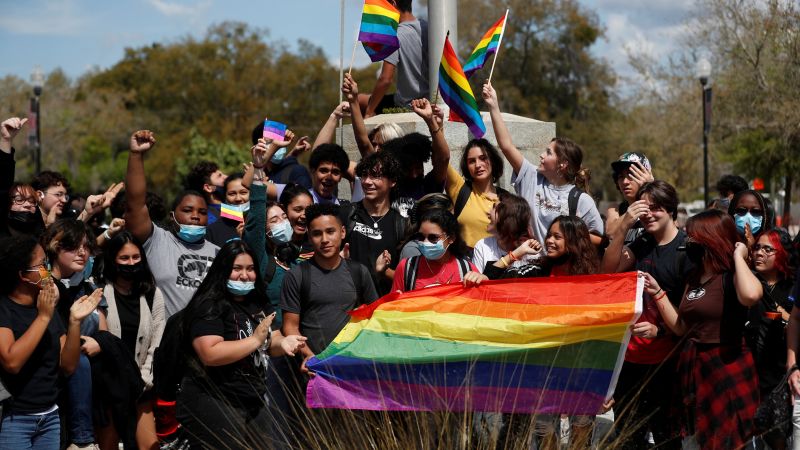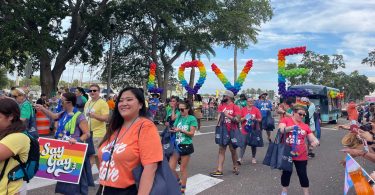CNN
—
Florida education officials and a group of LGBTQ advocates and families reached a legal settlement Monday that clarifies the scope of a statute referred to by critics as the “Don’t Say Gay” law, spelling out that students and teachers are allowed to discuss sexual orientation and gender identity in classrooms, as long as it is not part of formal instruction.
More than a dozen plaintiffs – including civil rights organizations, parents, students and teachers – challenged the statute in a lawsuit filed just days after Gov. Ron DeSantis signed the law in March 2022. They argued the legislation’s “vague” language would have a chilling effect on discussions of LGBTQ topics in schools as educators were left to grapple with confusion and fear over how – if at all – they were permitted to address such themes in their classrooms.
The original “Parental Rights in Education” law prohibited the instruction of sexual orientation or gender identity from kindergarten through third grade and restricted discussing the topics “in a manner that is not age appropriate” in all other grades. A year later, the Florida education board voted to expand the restriction to include all grades. Teachers who violate the state policy can be suspended or have their teaching licenses revoked.
The Monday settlement clarifies the law only applies to formal classroom instruction and does not restrict discussions of gender or sexuality that may arise during class participation or students’ schoolwork.
Several teachers who have fallen under scrutiny due to the law have expressed confusion over the restriction’s implementation, including a fifth-grade teacher who was investigated for showing a movie featuring a gay character and LGBTQ teachers who no longer felt they could discuss their lives or answer their students’ questions without fear of punishment.
The settlement determined teachers may respond to students who share details about their same-sex parents, provide feedback on students’ work if they have chosen to write about LGBTQ topics or answer questions about their own LGBTQ relationships or family members. The law also does not prohibit school personnel from intervening when a child is being bullied due to their gender or sexuality, it said.
Roberta Kaplan, a lawyer for the plaintiffs, celebrated the settlement as a “major victory for the many thousands of LGBTQ+ students, teachers, parents, and their allies throughout Florida.”
“Today’s settlement makes clear the legitimacy of gay student groups, safeguards against hate and bullying and the ability of LGBTQ+ students and teachers to openly draw or display pictures of their partners and families. Simply put, the State of Florida has now made it clear that LGBTQ+ kids, parents, and teachers in Florida can, in fact, say that they are gay,” Kaplan said in a statement.
The lawsuit plaintiffs included Equality Florida, an LGBTQ advocacy organization; Family Equality, a New York-based nonprofit, and several parents and students in Florida.
DeSantis’ office also heralded the settlement as a success, saying in a statement that the law will remain in effect and the case is soon expected to be dismissed by the court.
“We fought hard to ensure this law couldn’t be maligned in court, as it was in the public arena by the media and large corporate actors,” said DeSantis’ General Counsel Ryan Newman in a statement. “We are victorious, and Florida’s classrooms will remain a safe place under the Parental Rights in Education Act.”
The “Parental Rights in Education” bill passed amid a concerted push from state and federal Republican lawmakers to introduce bills aimed at restricting the discussion of pronouns, gender identity and sexuality in classrooms.
Under the settlement agreement, the Florida Board of Education will notify school districts about the clarifications provided in the settlement. CNN has sought comment from the Florida Department of Education and the Florida State Board of Education.
While the statute prohibits teachers from using books to instruct students about sexual orientation and gender identity, it doesn’t ban materials that reference LGBTQ topics, including library books, which are not deemed “classroom instruction,” the settlement said.
That determination comes amid a surge of efforts to ban or remove books with LGBTQ characters, authors or themes from school and university libraries, an effort advocates say is part of a broader, conservative-led movement that is limiting the rights and representation of LGBTQ Americans.







